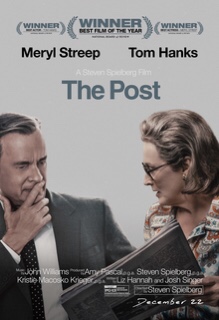

I wanted to watch a WWII naval film, having just finished a book about the Arctic convoys of WWII that supplied Russia with war materiel. But I couldn’t find any on that rather specific theatre of the war. And amongst the WWII naval movies I did find, there weren’t any I fancied that I hadn’t already seen.
So instead I chose The Post, thinking we hadn’t watched it. But we have! Teresa pointed this out very early on. And at that point I was adamant we hadn’t. But as the movie progressed, I realised she was right. It’s a bit worrying for me that I can forget a film so completely!
Directed by Steven Spielberg, The Post stars Meryl Streep as Katherine Graham, owner of the Washington Post, and Tom Hanks as Ben Bradlee, the Post’s executive editor. The film winds together several very interesting sociopolitical threads, one being Graham’s struggles as a woman in what was then a pretty exclusively male world, the other being freedom of the press (and, in the US, the ‘1st Amendment’), vs the power and interests of the State/government.
Beautifully filmed, expertly directed, with a very strong cast and extremely timely subject matter – the film came out during Trump’s presidency – it’s a very worthy film. And it received the plaudits it deserves. But it’s not problem free.
I don’t know enough about the details, but some criticise the movie for factual inaccuracy. One thing’s for certain, in true Hollywood style, Spielberg, an expert in cinematic drama, ‘plays’ the story on many levels, from simple atmosphere (the high drama of the news room) to emotional heart-wringing (the conflicted loyalties of powerful press folk and their politician friends).
One suspects – well, no, one knows – that fly on the wall documentation of these things (such dirty doings as Nixon was busy with, in the stuff that lead to Watergate), whilst sinister and immoral, is also most often a lot more humdrum. But, whilst these are real issues, ultimately I think the film succeeds, both as a movie, and as wagging finger in the moral political debate.
That said, despite starting with a brief ‘in the field’ Viet Nam segment, it’s very much what one would call a ‘procedural’ drama, with Spielberg doing his best to make numerous board meetings and suchlike visually and emotionally dramatic. And, witness my forgetfulness, as worthy as it is, it’s not the most exciting or memorable of films.
In fact, in a rare instance of advertising not totally misrepresenting the product, the poster at the top of this post accurately captures the drab monotone vibes of the ‘corridors of power’, the corporate culture in which the movie occurs.
It’s a very mixed bag, in the end. And whilst very worthy, in certain respects, it’s own compromised artifice undermines any gravitas it ought to have. Ultimately I found it rather disappointing.
